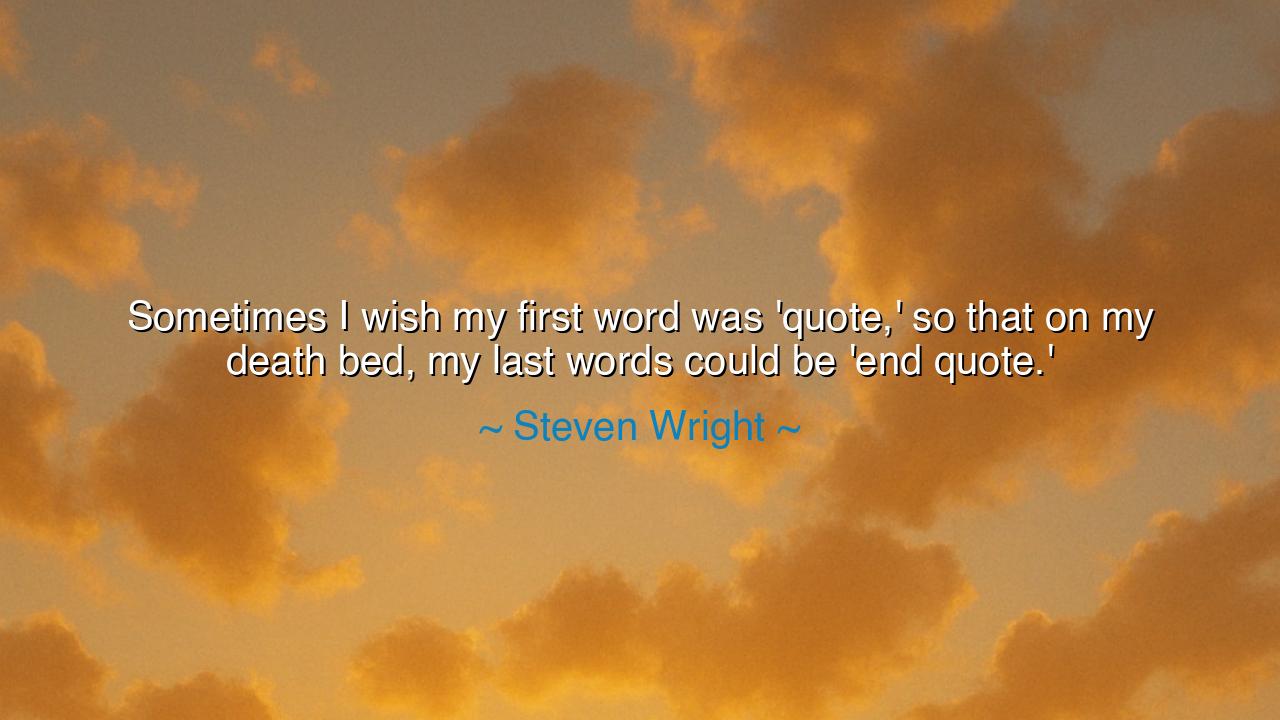
Sometimes I wish my first word was 'quote,' so that on my death
Sometimes I wish my first word was 'quote,' so that on my death bed, my last words could be 'end quote.'






“Sometimes I wish my first word was ‘quote,’ so that on my death bed, my last words could be ‘end quote.’” Thus spoke Steven Wright, the philosopher of humor — a man whose wit wrapped deep truth in laughter. Beneath the veil of irony and jest lies a reflection both tender and profound: the awareness of life as a sentence, bounded by its beginning and its end. In these words, Wright transforms a simple joke into a meditation on existence itself — a recognition that the human journey, from birth to death, is a story we each compose, a quotation within the vast speech of time.
To the ear of the unthinking, this saying may seem only a clever trick of language. But to the heart that listens more deeply, it whispers of the poetry of continuity, of the yearning to give shape to life’s fleeting moments. To begin with “quote” and to end with “end quote” is to declare that one’s life is not chaos, but composition — that every laughter, sorrow, and silence forms part of a single expression. Wright’s humor hides a profound longing for wholeness, for the ability to close one’s life with symmetry, to finish as gracefully as one began.
Throughout the ages, men have sought meaning in their last words. Socrates, when he drank the hemlock, spoke calmly to his disciples, saying, “Crito, we owe a cock to Asclepius; see that it is paid.” In this, he saw death not as tragedy, but as healing — the final act of a philosopher whose life was a dialogue. So too, in Wright’s jest, we find the same spirit: that even at the end, there is a wish for form, for completion, for the last line to match the first. He transforms the inevitability of death into an artist’s flourish, a punctuation of wit upon the page of mortality.
Yet there is more still. Wright’s wish is not only for a poetic death, but for a conscious life — one lived with awareness from the first word to the last. In desiring to frame his existence as a quote, he reminds us that words, once spoken, cannot be taken back, and that every choice, every act, adds meaning to the whole. Life, like speech, is brief and irreversible. To live, then, is to speak carefully — not timidly, but truthfully, as if every moment were part of a sacred utterance destined to be remembered.
Consider the story of Marcus Aurelius, the philosopher-emperor of Rome. His entire reign was a meditation on the impermanence of life and the power of reflection. He wrote not for glory, but to steady his own soul, leaving behind words that still echo through the centuries. His “first word” was duty, his “last” humility. In him, we see a man who lived as Wright imagined — a man whose life was an unbroken statement of purpose, whose final breath completed a thought that began long before.
Wright’s humor, then, is not simply laughter in the face of death — it is acceptance, and even mastery of it. By imagining his life as a “quote,” he turns mortality into art. He teaches us that even death can be met with wit and grace, that the end need not erase the beginning, but rather fulfill it. To say “end quote” is not to mourn the silence that follows, but to celebrate the sentence that was. It is to know that meaning was made, that the words mattered.
Lesson: Live your life as though it were a sentence worth quoting. Begin it with intention, fill it with truth and beauty, and when the time comes to say “end quote,” let your days form a story that needs no further explanation. Speak kindly, act bravely, and let your life’s language uplift those who hear it. For in the end, it is not how long we speak, but how well we have spoken that defines us.
So remember the wisdom hidden in Steven Wright’s jest: that life, however fleeting, can be made eternal through expression. Let each dawn be your opening “quote,” each act a word of purpose, and each night a pause of reflection. And when at last your time comes to whisper “end quote,” may your story ring clear — a complete thought, beautifully lived, perfectly said.






AAdministratorAdministrator
Welcome, honored guests. Please leave a comment, we will respond soon